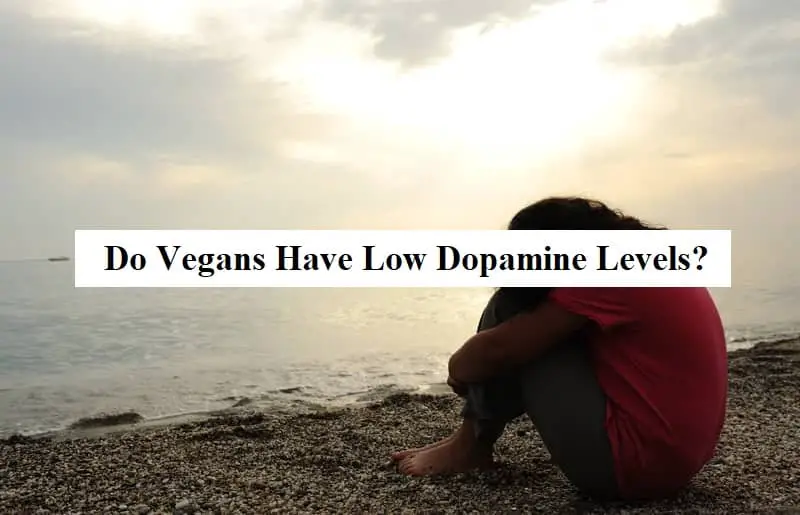If you’ve ever wondered whether the vegan diet could have any unique effects on dopamine levels, then you’ve come to the right place. I’m absolutely fascinated by brain chemistry, especially pleasure pathways, so I’m really glad this is a fairly common question.
But, does the vegan diet lower dopamine? In short, no. As in there are no reasons to believe that it does. While the subject is yet to be directly investigated, as of now there are no known mechanisms or data from observational studies that suggest the vegan diet lowers dopamine levels.
I think this question probably came about because of the study of vegetarians and depression that made the 24-hour news cycle a few months back.1
As you’ll see in the coming paragraphs, diet does affect mood in a variety of ways including dopamine pathways, but the well-established mechanisms have to do with specific nutrients more so than food groups.
I’ve often been asked about vegan-friendly supplements that may be useful when it comes to increasing dopamine levels.
There is one plant-based substance that’s been shown to increase dopamine levels, known as mucuna pruriens (I guess all the good names were taken).
It’s a rare source of the dopamine precursor l-dopa, so it’s much more effective in converting to dopamine compared to l-tyrosine, which mostly gets degraded when taken in large amounts. But, it does have its limitations, which we’ll cover below under the section on supplementation.
Definitely don’t purchase any until you read the section below on supplementation. Overall, it’s not a recommended supplement.
So, what I’ll do here is explain what dopamine is and why the vegan diet doesn’t lower it. Then I’ll tell you where, at least in part, the myth comes from. I’ll tell you which foods are high in the needed nutrients for dopamine production. Then finally I’ll tell you how the vegan diet has actually helped my mood.
So, if you want to learn why isn’t the culprit of low dopamine levels, and what you as a vegan can do to increase dopamine levels, read on.
What Is Dopamine and Why Is It so Special?
Dopamine Isn’t About Pleasure

The brain’s pleasure circuitry loves to use the neurotransmitter dopamine. If it runs out, your mood can hit the floor—what’s called dysphoria or anhedonia.
This “dopaminergic” (science-y way of saying involving dopamine) process begins in a brain region called the ventral tegmentum, and from there goes on to a bunch of other places that also have fancy names like nucleus accumbens, anterior cingulate cortex, etc.2 Not important.
One big misconception is that dopamine is the pleasure chemical. While there’s a sense in which that’s true, dopamine is about the anticipation of pleasure and reward, more so than the pleasure itself.2
Jaak Panksepp, author of Affective Neuroscience does a great job of making this distinction. He talks about what’s known as the SEEKING system. In doing so, he differentiates appetitive vs consummatory behaviors.
Dopamine Is About Motivation and Excitement
Dopamine is about motivation, the excitement of wanting to do things. It helps you to anticipate rewards. This may seem like a distinction without a difference to some, but there’s actually a huge difference between the feeling you would have after winning the lottery and the feeling you’d have when you’re spending the money after the initial excitement has worn off.
I always think of Christmas morning as a kid. While the feeling of basking in your new gifts is great, there’s nothing quite like the feeling you get when you’re waiting excitedly in the night leading up to it.
As Yuval Noah Harari wrote in his best seller Homo Deus, “Climbing Mount Everest is more satisfying than standing at the top; flirting and foreplay are more exciting than having an orgasm; and conducting groundbreaking lab experiments is more interesting than receiving praise and prizes.”3
The phrase, “the journey is better than the destination”, may sound like a cheesy cliché, and maybe it is, but there’s a lot of truth in it.
Dopamine Makes You Productive
One great thing about dopamine is that it makes you super productive. Because you anticipate reward for your actions, your more likely to put in the work. I’m sitting here writing this article right now because I’m anticipating that it may be of use to someone, and that I’ll get some good experience from writing a blog for the first time. More on this in the section on how the vegan diet has helped my mood.
You Don’t Need Animal Protein for Dopamine Production
It’s not that this is a particularly widespread belief or anything, but it is an objection that as a vegan you’ll hear from time to time.
But anyway, dopamine is made by the amino acid tyrosine, an AA that’s present in many foods.
So, when you consume a protein-rich meal it leads to an increase in the level of tyrosine in the brain, which cranks up the synthesis of neurotransmitters like dopamine and norepinephrine.4
You might be thinking: what about tryptophan? High-protein meals have tryptophan which ultimately turns into serotonin and then to melatonin making you sleepy. So, how can a high-protein meal make you motivated, and give you energy?
Even though a protein-rich meal contains both tyrosine and tryptophan, tryptophan is the least abundant AA in protein-containing meals. And since all AAs of this type compete for the same transporters into the brain (across the blood-brain barrier), AAs like tyrosine outnumber tryptophan.
And for this reason, protein-rich meals decrease the amount of tryptophan in the brain, while more tyrosine is available for uptake into the brain. Hence, more dopamine synthesis.5
Now, as I mentioned above, tyrosine is available from many food sources, both plant, and animal. But listen to the following framing: according to Klaudia M and Wojciech P, “an appropriate combination of plant-based products, such as cereal grains and some vegetables (e.g., soy, beans), may, to a certain extent, substitute the animal-based amino acids in the daily diet.”6
Catch the phrasing, “may to a certain extent”? As if your body knows the origin a given amino acid? In reality, tyrosine is tyrosine is tyrosine.
The fact is, there are many
Plant Foods High In Tyrosine (Dopamine Precursor)

Not only can you find tyrosine in plant foods, but according to nutritiondata.self.com, the top two sources of tyrosine are plants. Here are just a few sources.7
- Seaweed, spirulina, raw (popular food supplement these days)
- Soy protein isolate
- Mustard greens
- Spinach
- Sesame seeds
- Kidney beans
A Word on Supplementation
Why not just take dopamine? Dopamine itself is too polar and doesn’t cross the blood-brain barrier.
Then there’s levodopa (l-dopa). The molecule l-dopa is the true precursor to dopamine—tyrosine makes l-dopa which in turn makes dopamine.
Tyrosine can be used for many functions in the body (broken down for glucose, etc.), so just because you take a megadose of l-tyrosine doesn’t mean it’s all going to dopamine. However, once tyrosine makes l-dopa, there’s no going back.
Which is why taking l-dopa in mega doses is a great way to increase levels of dopamine… in the body (read: not so much the brain). When you take l-dopa orally, it’s rapidly converted by certain enzymes into dopamine in the periphery (not the brain). At which point your CNS burns through the dopamine before it has a chance to enter the brain.
Parkinsons patients take large doses of l-dopa, but it’s paired with carbidopa which prevents the l-dopa from being zapped up before it has a chance to enter the brain.
Some studies have shown it to raise levels of subjective well-being, but overall, it’s probably not that effective.8
I definitely noticed a mood boost when I took it, but it was quite subtle and almost unnoticeable when taken in small amounts.
So these supplements are really not that effective in raising levels of dopamine. And really, the long-term safety of supplementing with these compounds hasn’t been established.
How the Vegan Diet Helped My Mood
I think one reason this information interests me is that I know what it’s like to not be able to get excited about outcomes. I know what it’s like to sit down to write an article and think, what’s the point? Why am I doing this?
I used to be on a prescription drug called bupropion, known widely as Wellbutrin. In fact, I still have the prescription, but don’t take it anymore.
Now, I will say that bupropion was very helpful to me in, especially in certain seasons of my life—both figurative and literally as it’s used for seasonal depressive disorder (SAD).
For those who are unfamiliar with this medication, bupropion is dopaminergic antidepressant. I’m no expert, but from what I understand, it works to increase positive emotion, more so than keep negative emotion at bay (something that serotonergic antidepressants are known to do).
It acts on dopamine and norepinephrine to kind of give you an extra boost of motivation and optimism. People claim that it can be absolutely life-changing (in a good way), and it was very useful for me overall.
It’s worth noting that the efficacy of these drugs for treating true depression has been questioned, and I’m by no means qualified to say one way or the other. Placebo or no, it seemed to help lift my mood, and it definitely gave me energy.
Before switching to a whole food plant-based diet it was a lot worse. After making the transition to veganism, I slowly felt a creeping sense of wellbeing and general positivity.
For me, this way of eating provides a subtle, but more durable mood lift. And obviously, it doesn’t leave me feeling a bit tweaked out like bupropion.
Anyway, hopefully this gives you an idea of the relationship between diet and dopamine levels.
References
- Hibbeln JR, Northstone K, Evans J, Golding J. Vegetarian diets and depressive symptoms among men. J Affect Disord 2018;225:13-17.
- Affective Neuroscience: the Foundations Of Human and Animal Emotions, Jaak Panksepp – Oxford Univ. Press – 1998
- Homo Deus: a Brief History Of Tomorrow, Yuval Harari – Harper, an Imprint Of Harpercollins Publishers – 2017
- Lieberman, H. R., B. J. Spring and G. S. Garfield (1986). The behavior effects of food constituents: strategies used in studies of amino acids, protein, carbohydrate and caffeine. Nutrition Reviews 44 Suppl: 61–69.
- Wurtman, R. J. (1986). Ways that foods can affect the brain. Nutrition Reviews 44 Suppl: 2–5.
- Klaudia M and Wojciech P, Selected Psychological Aspects of Meat Consumption—A Short Review. https://www.ncbi.nlm.nih.gov/pmc/articles/PMC6165406/
- https://nutritiondata.self.com/foods-000087000000000000000.html

